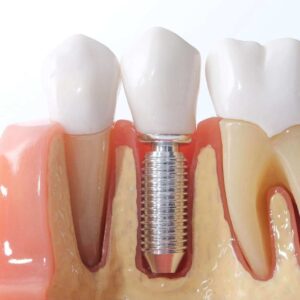Dental implants replace missing teeth to maintain the structure of the mouth and jaw. Dental implants look are function just like natural teeth and can last a lifetime with good oral hygiene and regular dental check-ups.
Types of dental implants?
Table of Contents
- Types of dental implants?
- Dental implants procedure?
- Why dental implants are so expensive?
- Why dental implants are important?
- When dental implants go wrong?
- Are dental implants safe?
- Are dental implants painful?
- How dental implants are installed?
- What dental implants cost in the UK?
- Dental implants can cause cancer?
- Dental implants can harm your health?
Dental implants are comprised of two parts: A titanium screw implant that mimics your tooth root that is fused into your jawbone and a dental crown that looks just like a natural tooth.
Endosteal are the most common types of dental implants. A small titanium screw is placed under the gum line, directly into the jawbone. After the jaw and gum tissues have healed from this procedure, a false tooth is placed on top.
Subperiosteal implants, consisting of a simple metal frame with a post(s) attached, are used when a patient does not have enough jawbone for a standard dental implant or does not wish to have a screw implanted directly into the jawbone. The implant is placed underneath the gum tissue’s surface but only rest on top of the jawbone.
Zygomatic implants are placed within the cheekbone rather than the jawbone but are extremely rare.
See the below video of dental implant through screw:
Dental implants procedure?
The first step to the dental implant procedure is an initial consultation where your dentist performs x-rays and tests to examine your mouth, as well as your jawbone. If your jawbone is in poor condition, you will need a bone graft to strengthen your jaw.
After all preliminary procedures have been completed and your mouth has healed completely, it is time to place the titanium dental implant into your jaw. Depending on your Implant dentist in Fulham, the process may vary due to more traditional versus more technology-driven implant systems.
Before the actual implantation procedure starts, you will be provided with a local anaesthetic or IV sedation to ensure you will not experience any discomfort. Next, the dentist makes a small incision into the gum tissue to expose the jawbone, when it comes to traditional endosteal implants. The implant will then be placed into the hole, and the gums will be sutured closed.
Over the next few months, the bone will, fusing to the artificial implant. Once the bone has healed completely, the patient will return to their dentist and receive an abutment, which acts as an anchor to the future crown. At the same appointment, a temporary crown may be placed on top of the abutment to keep it protected until an external lab has finished constructing the bespoke crown. Finally, the temporary crown will be replaced with a permanent one at a later appointment.
Some dentists also offer Digital Dental Implants and CEREC® technology. The implants are drilled through the gums and no long healing period is required before the abutment can be placed on top. At this appointment, you can be fitted for a crown right away.
See the full dental implants procedure through video:Why dental implants are so expensive?
Dental implants are expensive because they are typically a multi-step procedure that gives you a realistic looking and fully functioning tooth that can last a lifetime. You can eat, brush, and floss just like you would with your remaining natural teeth.
All of the components are high-quality materials like titanium and porcelain.
Why dental implants are important?
Dental implants are important to your oral, and overall health for four main reasons.
- They keep your remaining teeth from shifting
- Allow you to bite chew food better
- Improve self-confidence, especially in regards to your smile
- Keep your jaw strong
When dental implants go wrong?
Some medical conditions, especially the ones that impair your immune system, could inhibit your jaw from acclimating to your new implant. Any condition resulting in complete bone loss or decreased bone density could also make it harder to get and keep implants over an extended period.
Your medical history will be reviewed during your initial consultation, and your dentist will advise you on your eligibility as a suitable candidate for the procedure.
Are dental implants safe?
Dental implants are completely safe and are fitted by a dentist who is specially trained and educated in the implant procedure as well as the structures of the mouth.
Are dental implants painful?
It is completely normal to experience some bleeding, facial swelling, and bruising as well as minimal pain around the implant area.
If you experience any severe pain, swelling, bruising, or bleeding that lasts for more than 10 days, get in contact with your dentist, as an infection may have developed.
How dental implants are installed?
First, the gum tissue is opened to expose the jawbone. Next, a small hole is drilled into the bone, which is the exact shape and size of the implant. The implant is then screwed into the hole and left to heal, eventually fusing with the jawbone.
What dental implants cost in the UK?
If the implant is being installed purely for a cosmetic reason, you are responsible for the cost, which will vary depending on the placement of the tooth, whether you require a bone graft and the experience of your dentist. Most dentists offer financing options to help you spread-out the cost of the procedure.
If, on the other hand, the implant is necessary due to a preexisting medical condition, you may need to pay a fraction of the final price, ranging from £195 to £390. Ask your dentist about any non-implant dental work you may need to be carried out as part of your dental implant surgery such as a tooth extraction.
Dental implants can cause cancer?
According to a 2017 study published in the Journal of Oral & Maxillofacial Research, there are no scientific links between dental implants and cancer.
Dental implants can harm your health?
Because dental implant surgery is invasive and requires your body to acclimate to foreign materials, there is the possibility for health risks. Albeit, serious risks like nerve damage, injury to other teeth or blood vessels, and permanent sinus problems are quite rare.
Author Bio: This article contributed by Jatan Patel from Quality Dental Group. Quality Dental is one of the leading Dental Groups with clinics in Ruislip, Fulham, Worthing, Shoreham, Coulsdon and Brighton. As a State-of-the-art dentistry, Quality Dental offers private and NHS treatments that are effective, and long-lasting.
- How To Create A Safe And Comfortable Home Environment For In-Home Care In Boca Raton? - July 16, 2024
- 10 Trendy Black Nail Ideas To Elevate Your Nail Game - May 6, 2024
- Getting A Free Divorce In Virginia? Here’s What To Expect - April 24, 2024











Dr. Dome
•5 years ago
Spot on with this write-up, I truly think this website needs much more consideration. Ill probably be again to read much more, thanks for that info.
Sulaman
•5 years ago
Hi. Before reading this article was little worried about Dental implant but not now. This is very good article . Its help me to know more and more about Dental implants. Thank you for shearing this information with us.
Suntrics
•5 years ago
I am glad that I could help you 🙂
Linda Williams
•5 years ago
For the majority of patients in good health, implants are extremely successful when performed by a suitably qualified professional.
Monnin
•5 years ago
Really enjoyed this blog post.Thanks Again. Keep writing.
Steven Luther
•5 years ago
Way cool! Some very valid points! I appreciate you writing
this write-up plus the rest of the website is also really good.
Elise Boudreaux
•5 years ago
Thanks for sharing your thoughts. I really appreciate your
efforts and I will be waiting for your further write ups thank you
once again.
Stoney Brook
•4 years ago
Dental implants are a wonderful treatment which is adopted by most people now a days. There can be a few risks with dental implants that needs to be solved and one should adopt this treatment only after properly consulting the dentist and getting all the information. Thanks for sharing!
Dr Joy
•3 years ago
This is such a great article about dental implants. keep up the great work thank you
James
•2 months ago
This blog provides a thorough examination of dental implants, highlighting both their benefits and potential risks. It’s reassuring to see a balanced perspective that covers the health advantages of dental implants, such as improved oral function and bone preservation, while also addressing the risks, like infection and implant failure. Such comprehensive information is invaluable for anyone considering this treatment. Great read!